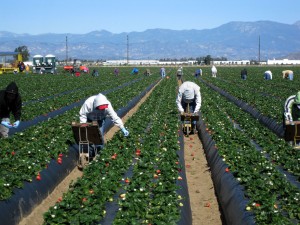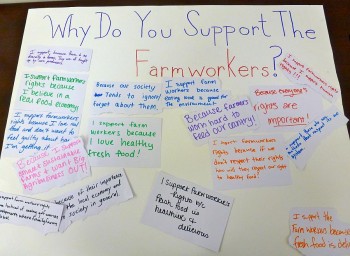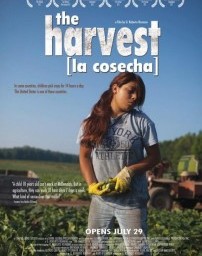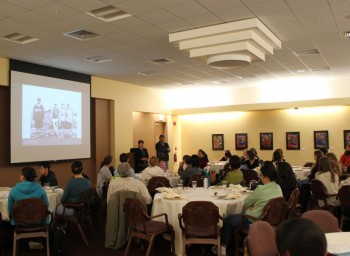Bon Appétit believes that making a difference in the lives of others—one that pays dividends long past the holiday season — is the best gift we can give. This year’s beneficiary is the Agriculture and Land-Based Training Association (ALBA).

Blog: Farmworkers
+ Blog Categories

Funding Small Farms “One Chick at a Time” at Carleton
- Blog
Strong local and regional food systems can lead to strong local economies and opportunities for people who are often left behind by traditional economic development. But it takes a while to build these systems. Bon Appétit was proud to cater a recent breakfast fundraiser for the Grow a Farmer Fund at Carleton College in Northfield, MN, which raised $4,270 for Latino farmers who want to raise free-range chickens in rural Minnesota.

Get the Facts about Farmworkers with New, Downloadable Slideshow
Last week, two elderly farmworkers took the brave and very unusual step of suing their employer, an onion grower in the Coachella Valley, for violating the few labor laws that protect farmworkers. California is one of the few states that require farmworkers to be paid the minimum wage. Farmworkers are exempt from many federal labor laws. These gaps were detailed in the Inventory of Farmworker Issues and Protections in the United States. We’ve created a new, educational slideshow based on key facts and statistics from the Inventory for educational purposes.

Students Share Why They Support Farmworkers
- Blog
Last week Bon Appétit Management Company cafés around the country celebrated 13th Annual National Farmworker Awareness Week (NFAW). As part of our efforts to make people think about who harvests their food, we asked students at colleges and universities to create a collage about why they support farmworker rights. Here’s how some thoughtful students from American University in Washington, DC; Goucher College in Maryland; and Emmanuel College in Boston finished this sentence: I support farmworker rights because…

Bon Appétit Celebrates 13th Annual National Farmworker Awareness Week
- Blog
As part of our focus on farmworker rights, Bon Appétit Management Company is proud to partner with Student Action with Farmworkers for the 13th annual National Farmworker Awareness Week (NFAW). Running from March 25 – March 31 (César Chávez’s birthday), NFAW aims to raise awareness about the conditions of the men, women, and children who harvest our food and to bring attention to their efforts to secure fair wages and benefits, and to form and join unions.

Jacobs Farm Proves that Big Isn’t Bad
- Blog
Jacob’s Farm is 300 acres plus 1 million square feet of greenhouse space filled with wonderfully pungent smells, intensely flavorful tastes, and beautiful, brightly colored flowers. This is one of the largest farms I’ve visited on my travels — and one of the most socially responsible. Jacob’s Farm offers great benefits to its employees: paying more than minimum wage and offering health care, dental care, and a 401(k) plan; and providing paid time off and end-of-year bonuses.

Irma Mendoza’s Story: The Difference Between Conventional and Organic
- Blog
The final event of last spring’s Your Food Chain series at Santa Clara University ended with the theme of strawberries. I had the honor of speaking alongside strawberry farmer Irma Mendoza. When Irma was 17, she left Mexico for the United States and naturally sought out a farm job. She started out harvesting strawberries, but her experiences growing in California were different from growing up in Mexico. The biggest difference being that the berries were grown with extremely toxic pesticides and chemical fertilizers.

Food Week at Penn Explores Making Fruits and Vegetables Cool
- Blog
The University of Pennsylvania celebrated this year’s National Food Day by kicking off its third annual Food Week: You Are What You Eat, sponsored by Bon Appétit at Penn Dining and supported by Fox Leadership. One of the major goals of Food Week each year is education — raising awareness about food issues in the hopes that awareness will ultimately lead to action.

“Ethically Delicious” Uniforms in time for Fair Trade Month
- Blog
Conscientious consumers rely on third-party-certified labeling programs such as organic, which reassures us that those products were grown without toxic pesticides or using genetically engineered seeds, and Certified Humane, which tells us that the animals we’re eating were raised ethically. But neither of those labels tells us anything about how the people behind the products were treated. That’s why the Fair Trade Certified™ label is so important. October is Fair Trade month, and we at Bon Appétit Management Company are proud to have partnered with Fair Trade USA to help raise awareness.
Young Farmworkers Share Their Stories in New Film
- Blog
For most industries, state law in North Carolina mandates that children must be at least 14 years old to work. But like the rest of the country, there is no age requirement for agricultural work and many start at 10 or 12, and get exposed to toxic pesticides during formative years. Toxic Free NC is a non-profit organization that works to “put people before pesticides” and advocates for alternatives that protect the health and environment of those in the surrounding community. In 2008, they started the Farm Worker Documentary Project, documenting the experiences of workers in fields and labor camps across North Carolina. Their most recent project is called Overworked & Under Spray: Young Farm Workers’ Pesticide Stories. Six young farm workers talk about their pesticide exposure in the fields and the resulting health effects. The film also includes advocacy […]
